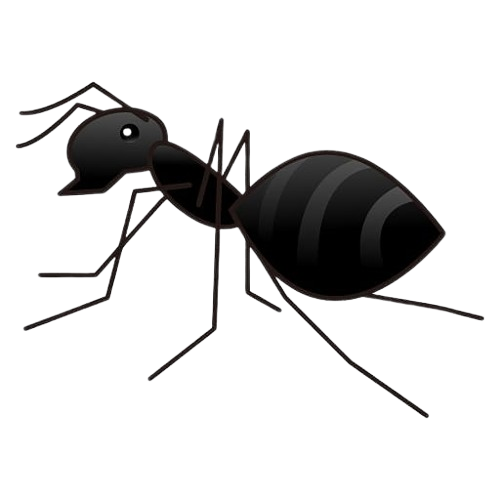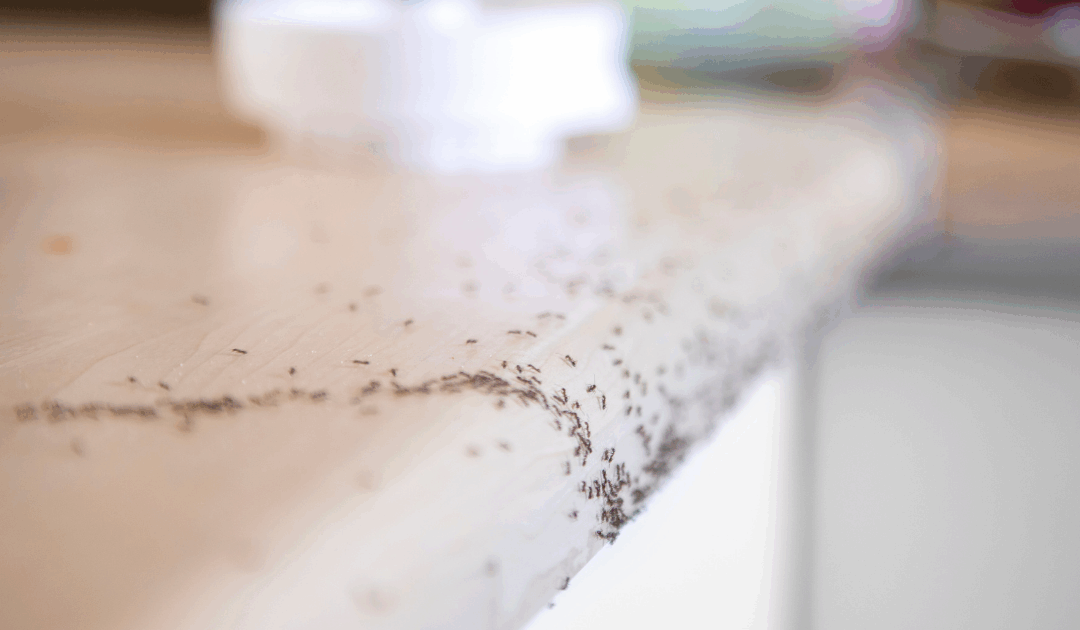
Sep 12, 2025 | Florida Pest Control
Fort Myers residents know the frustration well. You clean your kitchen, and within hours, a steady line of ants appears across the counters. Florida’s year-round warmth and humidity create ideal conditions for ant colonies to thrive, making prevention and control a regular part of maintaining a comfortable home. The good news is that lasting ant control is possible with proven strategies that protect both your family and the natural environment of Southwest Florida. Here’s how to tackle these persistent pests while keeping the area’s delicate ecosystem in mind.
Ant Control in Fort Myers
Understanding Fort Myers’ Ant Population
Southwest Florida’s subtropical climate supports several ant species that frequently invade homes. Ghost ants, with their translucent legs and bodies, often appear in kitchens and bathrooms in search of moisture and food. Fire ants build aggressive colonies in yards and deliver painful stings, while carpenter ants can damage wood structures as they tunnel to build nests.
Pharaoh ants present a unique challenge because they create multiple colonies and require specialized management. These tiny yellow ants can contaminate food and spread bacteria, making prompt action important for protecting health.
Each species behaves differently, so understanding their habits is key to choosing the right control methods.
Why Traditional Ant Control Methods Often Fall Short
Over-the-counter sprays may kill visible ants but rarely address the colony itself. Without eliminating the source, infestations often return. This cycle leads to repeated treatments that can affect beneficial insects, pollinators, and water quality in sensitive coastal areas.
Effective ant management requires a comprehensive approach that targets colonies, prevents new infestations, and protects the environment.
Natural Prevention Strategies That Work
Eliminate Entry Points
Inspect your home for cracks, gaps, and openings that ants could use to get inside. Common trouble spots include windows, doors, and utility penetrations. Seal gaps with weatherproof caulk, repair screens, and install door sweeps to block access.
Pay extra attention to moisture-prone areas. Afternoon storms in Fort Myers can create damp conditions that attract ants, so sealing these areas also supports moisture control.
Maintain Strategic Cleanliness
Reduce attractants by cleaning surfaces promptly after food preparation, especially behind appliances where crumbs and spills can go unnoticed. Store all food, including pet food, in sealed containers.
Empty trash bins regularly and ensure lids fit tightly. Wiping down surfaces with vinegar can erase the scent trails ants use to navigate, making your home less inviting.
Manage Moisture Levels
Proper ventilation and dehumidification help reduce indoor humidity. Address plumbing leaks promptly and check under sinks, around water heaters, and near outdoor faucets for moisture buildup.
Outside, improve drainage and keep gutters clear to prevent water pooling around the foundation.
Effective Natural Deterrents
Essential Oils
Peppermint oil is a well-known ant deterrent. Mix 10–15 drops with water in a spray bottle and apply to baseboards, entry points, and areas where ants are active. Tea tree and lemon oils offer additional protection and a pleasant scent.
Food-Grade Options
Diatomaceous earth damages the exoskeletons of crawling insects and works well when applied along trails and near entry points. Cinnamon powder can create a barrier ants will avoid, and ground coffee can deter several species while adding a subtle aroma.
Landscape Adjustments
Plant ant-repelling species such as mint, tansy, or pennyroyal along the perimeter of your home. Trim vegetation so it does not touch exterior walls, as plants can act as bridges for ants to enter.
Maintaining Long-Term Success
Ant control is most effective when prevention, sanitation, moisture management, and monitoring work together. Seasonal inspections help identify and address vulnerabilities early.
Keeping a record of what works on your property allows you to refine your approach over time. With consistent attention, these strategies help create an environment where ants are far less likely to take up residence, protecting both your home and Fort Myers’ coastal ecosystem. Contact local pest control professionals for a free ant control quote today!
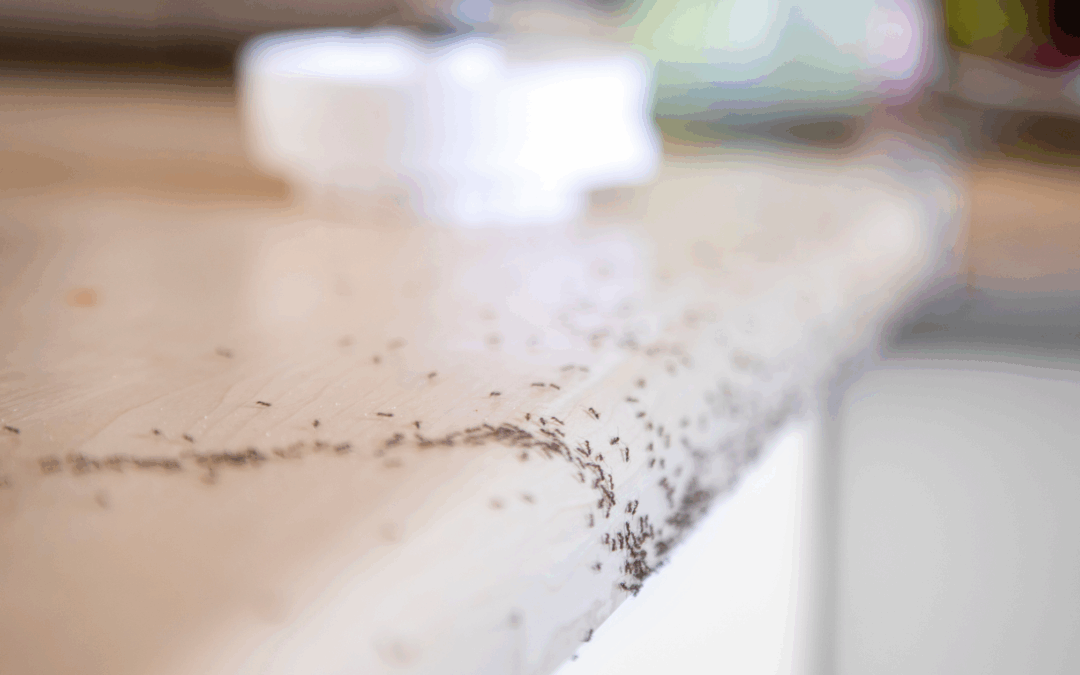
Jul 14, 2025 | Going Green, Pest Control
Finding ants in your bathroom can be a frustrating surprise, whether it’s a lone scout or an entire trail marching across your sink. These persistent pests are often drawn to damp spaces and sugary or soapy residues, making your bathroom a prime target. Luckily, you don’t need harsh chemicals to get rid of ants. With eco-friendly methods, you can tackle the problem swiftly and effectively while causing no harm. Here’s how to eliminate ants in your Anniston bathroom the green way, while keeping your family and the environment in mind.
Get Rid of Ants with Green Pest Control
Why Are Ants in Your Bathroom?
Understanding why ants are in your bathroom is the first step to getting rid of them. Ants are often searching for two things in this space:
- Moisture: Leaky faucets, damp towels, or even condensation on windows can attract ants needing water.
- Food Residue: Soap, toothpaste, or sugary residues left on counters or floors can be a food source.
Once they’ve found what they’re looking for, ants leave behind a chemical trail for others to follow, expanding the infestation. Addressing these attractants is key to stopping their march.
Step 1: Block Their Entry Points
Ants are tiny and highly flexible, which means they can enter through the smallest cracks or openings. Seal these gaps to prevent their access.
- Inspect for Cracks: Look along baseboards, window frames, and drains for potential entry routes.
- Seal with Caulk: Use non-toxic caulk to close gaps in walls and around fixtures.
- Install Drain Covers: This prevents ants from coming up through drains, a common entry point in bathrooms.
Blocking their pathways sends a clear message that your bathroom is off-limits.
Step 2: Use Natural Repellents
Skip the chemical sprays and opt for natural solutions that are effective yet healthier or your family and pets.
DIY Natural Repellent Ideas
- White Vinegar: Ants hate the smell of vinegar. Mix equal parts of white vinegar and water in a spray bottle, and spray along ant trails and entry points. Wipe down counters and floors with this mixture for a lasting effect.
- Peppermint Oil: Add a few drops of peppermint essential oil to water and spray it in areas where ants are active. Peppermint deters ants while leaving your bathroom smelling fresh.
- Cinnamon: Sprinkle ground cinnamon along window sills or baseboards where ants are entering. The strong scent disrupts their trails.
Other natural deterrents like citrus peels, bay leaves, or coffee grounds can also be placed near entry points to keep ants away.
Step 3: Keep Things Clean
Cleanliness is crucial in making your bathroom less inviting to ants.
- Wipe Down Surfaces Daily: Clean counters, sinks, and floors to remove soap residue, spilled toothpaste, and other attractants. Use natural cleaners like a mixture of baking soda and water for tough spots.
- Fix Leaky Faucets: Standing water from a drip can attract ants searching for moisture. Fix leaks quickly and keep sinks dry.
- Keep Trash Covered: Use a trash can with a tight-fitting lid to prevent ants from accessing any food scraps or tissues.
By removing their food and water sources, you’ll make it harder for ants to stick around.
Step 4: Take Preventative Measures
Preventing ants from returning is just as important as getting rid of the current infestation. Here’s how you can maintain an ant-free bathroom:
- Regular Inspections: Check caulking around sinks and tubs for new cracks.
- Dry Your Bathroom: Use a dehumidifier or open windows after showers to reduce moisture.
- Store Products Properly: Seal lotions, soaps, and other bathroom items that could tempt ants.
Taking these steps makes your bathroom less appealing to ants and other pests over the long term.
Getting rid of ants in your Anniston bathroom doesn’t have to mean using harmful pesticides. With a few simple changes, like sealing entry points, using natural repellents, and keeping things dry and clean, you can tackle the problem in an environmentally friendly way. Plus, with preventative measures in place, you’ll keep them out for good.
Eco-friendly pest control provided by a pest control company near you will keep your home and the planet, ensuring a healthier, greener future for all!
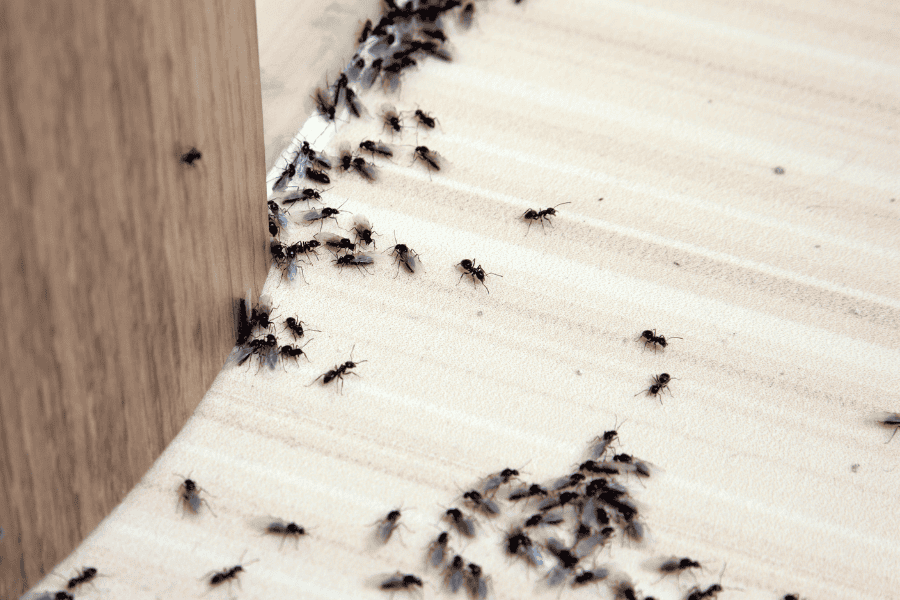
Jan 20, 2025 | Florida Pest Control, Going Green
Ants are small, but they can cause big frustrations in your Miami home. Whether it’s Argentine ants marching through your kitchen or fire ants invading your yard, Miami’s warm, humid climate makes the city a prime destination for these pests. Traditional pest control methods often involve harmful chemicals, but eco-friendly ant control alternatives provide effective solutions that are not harmful for your home, health, and the environment.
Here’s how Miami residents can keep ants at bay with natural, green pest control methods that work.
Eco-Friendly Ant Control Methods For Your Miami Home
Why Ants Invade Homes in Miami
Ants are always on the lookout for food, water, and shelter. Miami’s year-round warm weather, combined with the rainy season, creates the perfect environment for ants to thrive. They’re often attracted to crumbs, leaks, or even the smallest cracks in your home’s exterior.
Common Ant Species in Miami
Understanding which ant species you’re dealing with is key to effective pest control. Here are some common ants in Miami:
- Argentine Ants: Known for forming massive colonies, they can be difficult to eliminate.
- Carpenter Ants: These ants excavate wood, which can lead to structural damage over time.
- Fire Ants: Known for their painful stings, fire ants are a common problem outdoors.
- Ghost Ants: Small and light-colored, they often invade kitchens in search of sugary foods.
Eco-Friendly Pest Control for Ants in Miami
Natural Deterrents
Using natural substances to repel ants is a great first step to keeping them out of your home:
- Vinegar: A 50-50 mix of vinegar and water will disrupt ant trails and eliminate scent markers.
- Lemon Juice: Spray lemon juice near ant entry points to deter them.
- Essential Oils: Peppermint, tea tree, or cinnamon oils are highly effective in repelling ants when diluted in water.
DIY Ant Baits
Eco-friendly baits are a great way to target the colony itself. Mix sugar and boric acid into a paste and place it near ant trails. Worker ants will carry it back to the colony, slowly eradicating the infestation.
Diatomaceous Earth
Diatomaceous earth is a natural powder that can be sprinkled around your Miami home. It dehydrates ants and works effectively in places like baseboards and entryways.
Preventing Ants in Your Miami Home
Keep Your Miami Home Clean
Ants are attracted to crumbs and food residue. Ensure your Miami home is spotless by:
- Cleaning up spills and crumbs immediately.
- Storing food in airtight containers.
- Washing dishes promptly and keeping sinks clear.
Eliminate Water Sources
Fix leaking pipes and faucets in your Miami home and dry up moisture in kitchens and bathrooms. Ants are always on the lookout for water sources and removing them will discourage them from entering.
Seal Entry Points
Ants can sneak into your home through the smallest gaps. Be sure to:
- Seal cracks around windows, doors, and foundations.
- Install weather stripping to block gaps around exterior doors.
- Repair any tears in window screens.
Manage Your Miami Yard
Miami’s tropical environment provides a perfect place for ants to thrive. Here’s how to keep them out:
- Trim trees and bushes to prevent ants from reaching your home.
- Remove leaf litter and woodpiles near the foundation.
- Ensure outdoor trash bins have tight-fitting lids.
Use Ant-Repelling Plants
Certain plants can naturally repel ants while adding beauty to your home. Consider growing:
- Lavender
- Mint
- Rosemary
- Marigolds Plant these around your home’s entry points or in your garden to create a natural barrier.
Eco-Friendly Ant Control: A Miami Homeowner’s Guide
- Identify the ant species to target the right control methods.
- Use natural deterrents like vinegar, lemon juice, and essential oils.
- Create DIY solutions with boric acid baits and diatomaceous earth.
- Eliminate outdoor nests with boiling water.
- Prevent future infestations with cleanliness, sealing entry points, and yard management.
Go Green for an Ant-Free Miami Home
Miami’s warm climate makes ant infestations a common issue, but eco-friendly pest control solutions provide a greener way to protect your home. By using natural deterrents, sealing entry points, and focusing on prevention, you can keep your Miami home ant-free without relying on harmful chemicals. If you’re ready for a green pest control plan, contact a local pest control company for a free estimate.
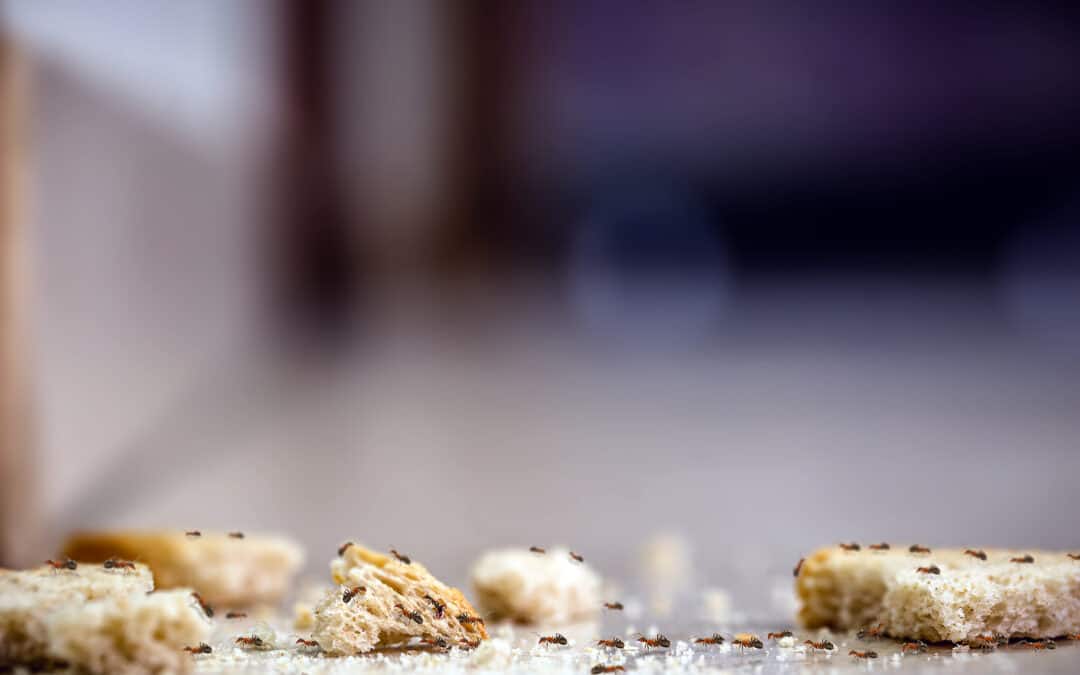
Apr 4, 2023 | Pest Control
If you have never encountered ants in your Alabama home, then count yourself lucky. These household pests have a knack at being some of the most annoying pests to infest – taking over your pantry, kitchen, bathroom, you name it! Here are the best methods of ensuring your home is never taken over by ants!
Know Where They Hang Out
It’s not surprising to hear that ants prefer to invade kitchens; after all, they provide food, water, and everything ants (and other pests) need to survive. Bathrooms, bedrooms, living rooms, basements, inside walls, and in or around air conditioning and heating units are also known to attract these nuisance pests.
Eliminate Water Sources
Moisture and standing water are big attractants for ants and many other pests. Be sure to repair any leaky pipes, and routinely check for excess moisture. If your basements, crawlspaces, or attics appear to be damp, then utilize a dehumidifier. On the outside of your home, ensure gutters and downspouts are functioning properly.
Eliminate Food Sources
Keep your kitchen tidy by cleaning up after cooking and eating to lessen the chance of crumbs being left out. Utilize airtight containers to keep opened food items safe from these tiny pests. Also, make sure to clean up pet food that’s left out, as this is also an attractant for pests.
Eliminate Access Points
If ants are finding their way inside, then that means there are entry points on the exterior of your home. Take the time to find where ants are making their way indoors and seal any cracks, gaps, or openings. Utility pipes are usually the number one place where ants can find any potential openings.
Reach out to your local pest control company and they can provide an ant-free home!
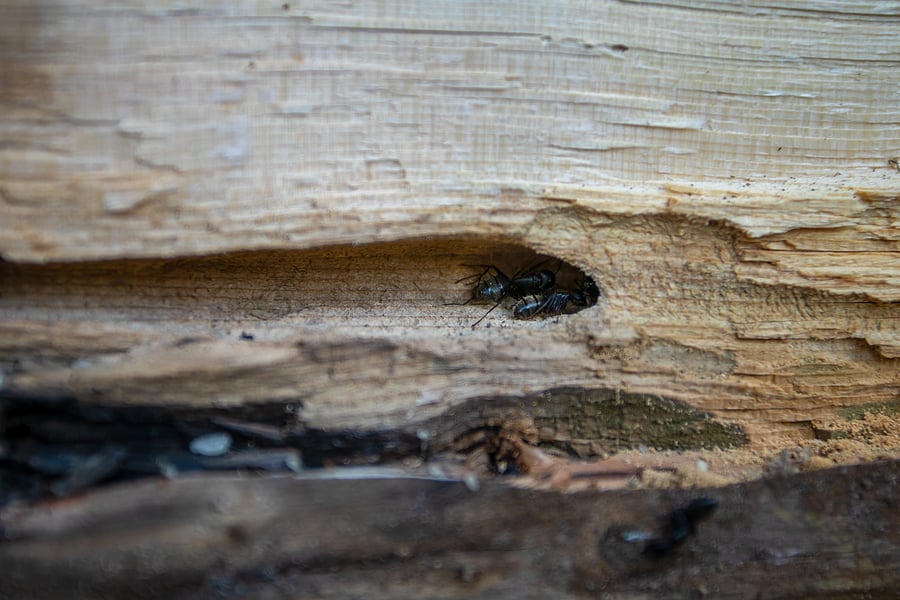
Aug 8, 2022 | Florida Pest Control
Ft. Myers Pest Control: Signs of an Ant Infestation
Ants are small, annoying, and can sometimes lead to health risks. Finding them infested in your home is always alarming! There are several ant species found in the Fort Myers area, including ghost ants, white-footed ants, and carpenter ants. Once these pests infest your home, it can be extremely difficult to get rid of them. Check out our top 3 signs you need ant control for your home.
Noticing Sawdust Trails
Carpenter ants are known to nest in damaged wood, especially wood that is damp from water. Their damage includes excavating wood to create their nests and creating holes. If you notice small trails of sawdust around, inside, or outside the home, it’s likely that you have ants.
Look for piles of sawdust near wooden beams, window ledges, skirting boards, and wood flooring. If you find sawdust or even the holes they create, it’s a sign that carpenter ants have infested.
Discarded Wings
Did you know that some ant types have wings for a short time? These ‘flying ants’ will usually swarm during the summer when a younger queen leaves the nest to start their own colony. If you notice discarded wings on the floors, windowsills, or doorsills, an ant colony could be inside the home.
Wooden Structures are Damaged
One of the more serious signs of an ant infestation is noticing that your home’s wood structures are crumbling when touched. This is a sign that the home structure is weakened, sometimes caused by ants. Often, the wood can look normal from just looking at it, but a tell-tale sign if ants have infested is finding hollow-sounding wood that is weak under pressure.
To prevent ants, utilize these preventative measures throughout your home,
- Seal any gaps or holes leading into the home.
- Trim back tree branches and shrubs away from the home to eliminate access points.
- Reach out to your local Ft. Myers pest control company to provide you with the best prevention and treatment options for ants.







